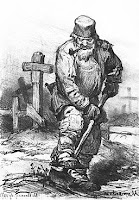 | |
| 17th Century Physicians Dissecting a Body |
My era is 17th century
London when medical doctors used hanged convicts to study anatomy. They would
cut up the dead to see how men and women’s organs worked. Plague victims were also
dissected. Opening the body, physicians who survived the pestilence found
evidence of the buboes on lungs and other innards, or so they wrote.
The Royal Society used live
animals to experiment on, like transferring blood from one dog to another then documented
the results. Generally, one dog lived (the one receiving the gift of blood) and
the other (who gave the blood) died. Unfortunate.
 |
| Body Snatcher at Work |
Into the 18th century
the laws changed. There were fewer hangings and more deportations to penal
colonies. This caused slim pickings in the London cadaver field.
Medical men faltered a bit, then
someone came up with an idea. Why not snatch bodies from the grave? I mean, no
one will know. The dead person won’t care. For the fellas digging up the
bodies, they can take rings and gewgaws left on the body as an added incentive.
Everyone’s a winner.
Well,
not really. Families of the dead and gone got wind of these ‘body snatchers’
and protected their loved ones with a mortsafe (dictionary.com says a mortsafe is
a heavy iron cage or grille placed over the grave of a newly deceased person in
order to deter body snatchers.). These would be used until everyone felt certain the poor dead
person wouldn’t be ‘fresh’ enough for dissection.
 |
| Mortsafe |
During the early 19th
century if you were caught digging up a body you could be heavily fined or
deported. Not fun, but hey, the reward was worth the danger. Men in the medical
field took the bodies no questions asked. Everyone was happy—or so one would
think. Unfortunately, greed got in the way of a good thing.
A man in Edinburgh owned an inn
for pensioners. One fellow died owing Mister Hare £4
which annoyed him. Along with another fellow (Burke), Hare removed the
pensioner’s body from the coffin, filled the said box with something equivalent
in weight; then hid the cadaver in an empty room down the hall. The parish
authorities took the coffin away, blissfully unaware there was no body in the
box.
Hare and Burke
sold the body to a physician for £7, 10s, making a tidy profit. The process was
relatively safe. No middle of the night dig in a cemetery. No worries of
getting caught, being fined or deported. The men did not suffer driving rain or snow
down their collars while at a dig, nor did they have to fret over sharp winds
that could easily blow off their caps. Their new boots and carpets remained clean from graveyard dirt. (After all, the men had to spend
their newfound wealth somewhere.) Hare and Burke had found a sweet deal at the pensioners’
inn.
Hare loved
this new, lucrative end of the business. When another pensioner dropped off the
twig, he and his partner repeated the process, but when another pensioner took
too long to pop off, they smothered him with a pillow. It was worth the effort,
for they received £10.
After a
while, the inn ran dry of almost dead persons so Hare and Burke lured vagrants,
drunks and prostitutes into their fine abode. They plied them with drink then
smothered them after passing out. If they wouldn’t obey by slipping into a
drunken sleep, “Burke would pin him down while Hare smothered him, holding his
hands over the victim’s nose and mouth.”
As you would
expect, Hare and Burke became reckless. “First, they killed Mary Paterson, a
voluptuous 18 year old—so free with her body that it was recognized by the
physician’s medical students.” When they “murdered ‘Daft Jamie’, a familiar,
good natured imbecile who made his living running errands on the streets of
Edinburgh”, suspicion raised its dark brow.
The men were
eventually arrested. Burke hanged before a large crowd some say that numbered in the 30,000’s.
His body was dissected on the physician’s table he and Hare had sold so many
bodies to.
But Hare
escaped this wicked end by giving state’s evidence, which meant he pointed his
finger at the physician and his assistants. While in the school, the physician was
stormed by a mob but police intervention saved his life. Even though he
protested his innocence, he lost his profession and was hounded out of town.
And so goes
a sad, woeful tale of murder and other horrible deeds.
~~~~~~
The People’s Almanac by David
Wallechinsky & Irving Wallace, Doubleday & Co., Inc., New York 1975
All pictures come from
Wikicommons, Public Domain
 |
| Buy Here |













